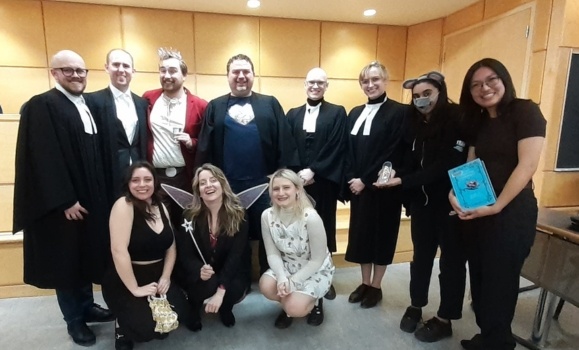This yearâs Weldon Literary Moot took place on March 19 at the Weldon Law Building. Cinderella v. Charming, a royally contentious divorce case, landed in judicial mediation thanks to a battle over sole ownership of the former coupleâs most prized possession â Cinderellaâs glass slipper.
The dynamic cast included law students Nicholas Worsley as Prince Charming, Geeta Mudhar as Rat, Chaeyon Lee as Bailiff, and English student Ella Ratz as Evil Stepmother. Halifax Fringe actresses Gil Anderson and Sara Graham played Cinderella and Faerie Godmother.
Law students Liam Wilford and Ferris Vasko appeared as counsel for Cinderella, and Davin Portz and Benjamin Lohoar represented Prince Charming. Schulich Law program manager Adam Guzkowski presided over the moot.
Cinderella v. Charming: Happily Never After
Our story begins in a university classroom, in a law school far, far awayâŚ
Once upon a time, a charming prince met a beautiful maiden, they fell in love, got married after dating for a week, and were supposed to live happily ever after. Except, they didnât. Instead, the beautiful maiden was jealous and insecure, and the charming prince was a gaslighting narcissist, and their relationship was doomed to fail from their first fateful meeting at the ball.
Fast-forward to seven days post-wedding when, after accepting the fact that their marriage was irrevocably broken, Cinderella and Prince Charming embarked on a complex and contentious divorce process. Following intense negotiations between their counsel, the two parties had agreed on all terms but one - who got to keep the infamous glass slipper.
Cinderella claimed ownership of the shoe, while Charming, who had a particular predilection for feet, maintained that she had given it to him as a gift.
Evidence presented by the princeâs counsel indicated Cinderella had the slippers custom-made, from glass, to show off her feet specifically to the prince and appeal to his âunique preferencesâ. His counsel also argued it was a gift given Cinderellaâs phone number was inscribed on the heel, below the message, âFor a good time, call meâ.
Meanwhile, Cinderella maintained that while the slippers were designed to show off her feet to Prince Charming, they had been inspired by a pair her mother had owned and she had never intended to give one to him.
One of the witnesses called to testify on her behalf was Cinderellaâs Faerie Godmother, who chose to use her time on the stand as an opportunity for shameless self-promotion, giving the audience the promo code âDivorce10â to receive a discount on her makeover services.Ěý
Another witness, Cinderellaâs so-called Evil Stepmother, was proven instead to be a caring maternal figure who deeply loved her stepdaughter, despite years of being maligned by the manipulative maiden in order to drum up more sympathy for herself.
On the stand, Cinderella appeared to be a paranoid and controlling wife who yelled at Charming for talking to other girls when he was simply giving speeches to his subjects. It was also revealed that she kept rats on hand as servants, affectionately calling them her âwoodland helpersâ. However, when questioned about the situation, one of the rats explained they were in fact being held against their will and couldnât leave as Cinderella had their passports.
When Prince Charming had the chance to testify, he came across as a narcissistic charmer who kept flirting with the judge, and whose claim to the slipper may have been only based on his interest in feet.Ěý
After hearing testimony from witnesses and arguments from counsel, the judge awarded the slipper to Cinderella, but in the end it landed in the hands of the rats, in place of their unpaid wages.
Courtroom Comedy for a Good Cause
The annual sketch-comedy moot is organized by the Weldon Literary Moot Society (WLMS) and raises money for the , a non-profit organization that provides university-level humanities education to community members who otherwise wouldnât be able to afford it.
Every year, the law students involved start brainstorming the mootâs concept in the fall, which is usually related in some way to the Halifax Humanitiesâ curriculum and then options are voted on by members in November. Previous moots have been based on Alice in Wonderland, Hamlet, Julius Caesar, Charlie and the Chocolate Factory, and The Hobbit, to name a few.
From January to March, the society members reach out to find additional moot participants and after a couple of rehearsals to assign roles and sketch out the structure, the actors write their parts. After a final meeting, there is a dry run on the night of the show.
âThe Literary Moot is the most fun thing I have had the pleasure to take part in in law school,â says Wilford, WLMS President. âAs students in a demanding program, it can be so easy to get lost in the academia of it all. The literary moot gives us the chance to creatively apply the legal knowledge and skills that we have learned while raising funds for a program that directly benefits the community.â
This year, the Literary Moot raised more than $2,000 for the Halifax Humanities Society.
Ěý
Recent News
- Professor Emeritus Wayne MacKay ft in "Legal columnist Wayne MacKay looks at toughâonâcrime campaign promises"
- Professor Emeritus Wayne MacKay ft in "A closer look at "tough on crime""
- Associate Professor Naiomi Metallic ft in "Opinion: Indigenous issues absent in federal election"
- Dalhousie Legal Aid Service ft in "Dalhousie Legal Aid urges vigilance as stricter deadlines for tenants are put in place"
- Professor Matthew Herder ft in "Canadians could lose vital safety information amid deep cuts to the U.S. FDA, experts warn"
- Professor Kim Brooks ft in "Opinion: Trumpâs freeze on national research funding an in for Canada"
- Associate Professor Michael Karanicolas ft in "Lawyers say Advocates' Society needs reform after org cancels event amid keynote speaker backlash"
- Professor Emeritus Wayne MacKay ft in "Nova Scotia moving to modernize traffic safety protocols"

